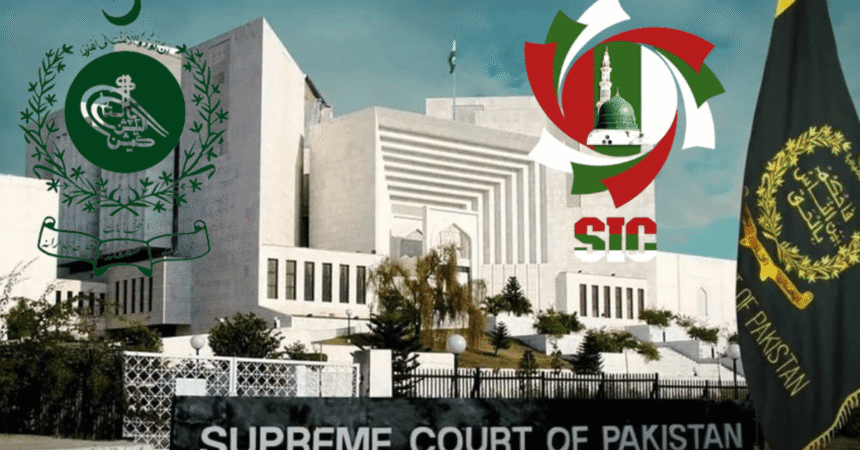Introduction
The Supreme Court of Pakistan (SCP) recently released a comprehensive 70-page judgment regarding the reserved seats case involving the Sunni Ittehad Council (SIC). Authored by Justice Mansoor Ali Shah, the verdict not only addresses the specific legal issues surrounding the case but also highlights broader principles relevant to electoral integrity, representation, and the rights of marginalized groups within Pakistan’s political framework. The judgment serves as a crucial reminder of the vital role that fair electoral processes play in strengthening democracy and safeguarding the interests of diverse communities.
Context of the Case
Background on Reserved Seats
In Pakistan’s parliamentary system, reserved seats are designated for women and minorities to ensure their representation in legislative bodies. This provision is rooted in the Constitution of Pakistan, which mandates inclusivity and diversity in governance. However, the actual implementation of these provisions has often been fraught with challenges. The SIC’s case arose from grievances regarding the allocation and management of these reserved seats, leading to legal disputes that necessitated judicial intervention.
The Sunni Ittehad Council’s Position
The SIC, a coalition of Sunni Muslim organizations, filed a petition questioning the methods employed in the allocation of reserved seats. They contended that the existing processes were inadequate and did not align with constitutional guarantees, which undermined their representation in the legislative assemblies. The SIC’s stance highlights ongoing concerns about the political marginalization of certain groups and the need for reforms to ensure equitable participation in governance.
Key Points from the Verdict
Justice Mansoor Ali Shah’s verdict encompasses several essential themes that reflect the court’s approach to electoral disputes, particularly concerning reserved seats:
1. The Stakes of Elections
One of the central tenets of the judgment is the assertion that the stakes in elections fundamentally lie with the people. This statement emphasizes the idea that electoral outcomes directly affect the lives of citizens and their representation in government. The court posits that the electoral process is not merely an administrative function but a civic duty that impacts democratic governance. This perspective reinforces the notion that any disputes regarding elections must prioritize the will of the voters.
2. Unique Nature of Election Disputes
The ruling distinguishes electoral disputes from other civil matters, asserting that they possess unique characteristics that require specific legal considerations. While civil disputes typically involve property rights or contractual obligations, electoral matters have far-reaching implications for democracy itself. The court emphasized the necessity of expeditious resolution of electoral disputes to prevent disenfranchisement and maintain public confidence in the electoral process.
3. Clarification of Legal Principles
The verdict seeks to clarify the legal principles governing electoral processes, particularly those related to the allocation of reserved seats. Justice Mansoor Ali Shah elaborates on the need for clear and consistent procedures to ensure that electoral decisions are made fairly. This clarity is crucial for preventing ambiguity that could lead to further disputes and dissatisfaction among stakeholders.
4. Reinforcement of Electoral Integrity
Another significant aspect of the judgment is the emphasis on maintaining the integrity of the electoral process. The court advocates for transparency and fairness in elections, recognizing that public trust in democratic institutions is paramount. Upholding the rule of law in electoral matters is essential for preserving the legitimacy of elected representatives and the institutions they represent.
Implications of the Verdict
The Supreme Court’s detailed verdict has far-reaching implications for Pakistan’s electoral framework, particularly regarding the handling of reserved seats:
1. Legal Precedents for Future Cases
The judgment establishes important legal precedents that can guide future cases involving reserved seats and electoral disputes. By clearly outlining the procedures and legal principles involved, the Supreme Court’s ruling creates a reference point for similar cases, promoting consistency in judicial outcomes. This consistency is vital for building a coherent legal framework surrounding electoral matters.
2. Encouragement of Public Participation
By reaffirming the importance of electoral integrity, the verdict serves as an encouragement for greater public participation in the democratic process. When citizens are assured that their votes are counted fairly and that their representatives reflect their interests, they are more likely to engage actively in elections. This increased civic engagement can lead to a more vibrant and participatory democracy.
3. Strengthening Minority Representation
The ruling holds particular significance for minority representation in Pakistan. By emphasizing the need for fair allocation of reserved seats, the judgment supports efforts to ensure that minority groups have adequate representation in legislative bodies. This focus on inclusivity contributes to a more diverse political landscape, which is essential for the health of democracy.
The Broader Context of Electoral Reform in Pakistan
Historical Challenges
Pakistan’s electoral history has been marked by various challenges, including allegations of rigging, mismanagement, and lack of transparency. These issues have contributed to public disillusionment with the political process and have often led to protests and demands for reform. The Supreme Court’s judgment is a response to these historical challenges and seeks to provide a framework for addressing them in the context of reserved seats.
The Role of Political Parties
Political parties in Pakistan have also played a crucial role in shaping the electoral landscape. However, the practices of party politics can sometimes undermine the objectives of reserved seats. For instance, some parties may prioritize their internal dynamics over the representation of marginalized groups, leading to further disenfranchisement. The Supreme Court’s ruling emphasizes the need for political parties to adhere to principles of fairness and inclusivity in their electoral practices.
Civil Society and Advocacy
Civil society organizations have been at the forefront of advocating for electoral reforms in Pakistan. These organizations often work to raise awareness about the importance of fair representation and to hold political parties accountable for their commitments to inclusivity. The Supreme Court’s judgment aligns with the efforts of civil society by reinforcing the need for a transparent electoral process that benefits all segments of society.
Community Reactions to the Verdict
The release of the Supreme Court’s verdict has elicited a range of responses from various stakeholders:
Political Reactions
Political leaders and parties have generally welcomed the judgment, recognizing its importance in promoting electoral integrity. Some parties have expressed their commitment to implementing the recommendations outlined in the ruling, particularly those related to the allocation of reserved seats.
Public Sentiment
Among the general public, there is a sense of cautious optimism regarding the verdict. Many citizens hope that the ruling will lead to tangible improvements in the electoral process and greater representation for marginalized groups. However, there are also concerns about the implementation of the judgment and whether it will translate into meaningful changes on the ground.
Activist Responses
Activists and civil society organizations have applauded the judgment as a step forward in the struggle for electoral reforms. They emphasize that the ruling provides a vital opportunity to address longstanding issues related to representation and inclusivity. Activists are calling for sustained advocacy and pressure on political parties to uphold the principles outlined in the Supreme Court’s verdict.
The Path Forward: Implementing the Verdict
Monitoring and Accountability
For the Supreme Court’s judgment to have a lasting impact, mechanisms for monitoring and accountability must be established. This could involve regular assessments of how political parties implement the ruling and the effectiveness of the procedures for allocating reserved seats. Civil society organizations can play a critical role in this monitoring process, providing independent oversight and advocating for necessary reforms.
Legislative Reforms
In addition to judicial oversight, legislative reforms may be necessary to ensure that the principles articulated in the verdict are codified into law. Policymakers must work collaboratively with stakeholders to develop comprehensive electoral reforms that address the root causes of the issues identified in the judgment. These reforms should focus on creating a transparent framework for the allocation of reserved seats and ensuring that minority representation is not merely symbolic but substantive.
Engaging the Youth
Engaging the youth is essential for fostering a more inclusive political culture in Pakistan. As future leaders and voters, young people must be educated about their rights and the importance of fair representation. Initiatives aimed at empowering youth through awareness campaigns, workshops, and leadership training can help cultivate a new generation of politically active citizens.
Conclusion
The Supreme Court’s detailed verdict on the reserved seats case represents a pivotal moment for Pakistan’s electoral landscape. Justice Mansoor Ali Shah’s ruling not only clarifies essential legal principles but also reinforces the importance of a fair and transparent electoral process. As Pakistan continues to navigate its democratic journey, the implications of this judgment will resonate in future electoral practices and contribute to the ongoing discourse surrounding representation and inclusivity in the political sphere.
The court’s commitment to upholding the rights of the electorate is a step forward in strengthening democracy in Pakistan. However, the true impact of this judgment will depend on the collective efforts of all stakeholders—government officials, political parties, civil society, and the public—to ensure that the principles of fairness and representation are upheld in practice. Only through sustained advocacy, accountability, and engagement can Pakistan realize its aspirations for a truly representative and democratic political system.
#SupremeCourt #Pakistan #ReservedSeats #ElectoralIntegrity #JusticeMansoorAliShah #SIC #PoliticalReform #Democracy #MinorityRight







